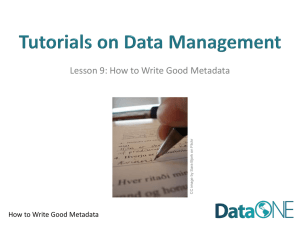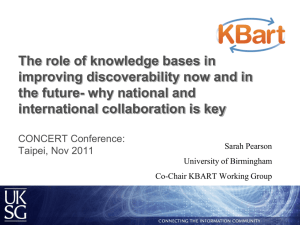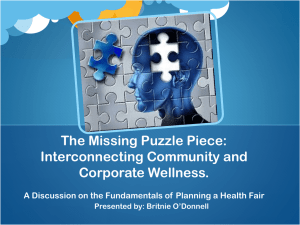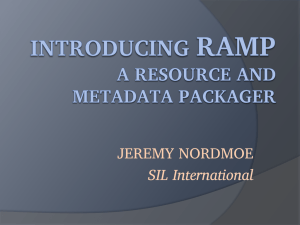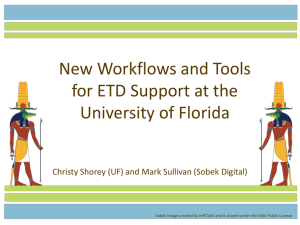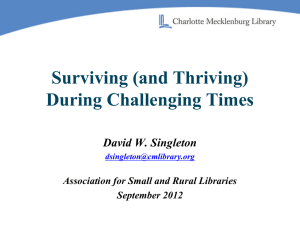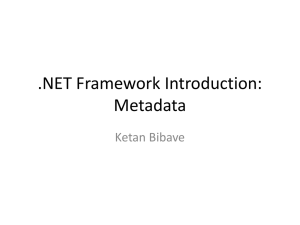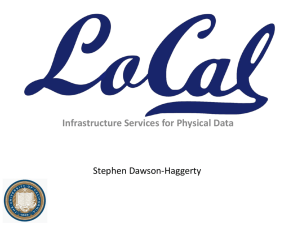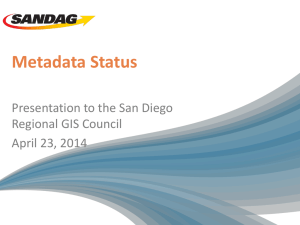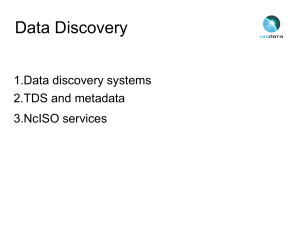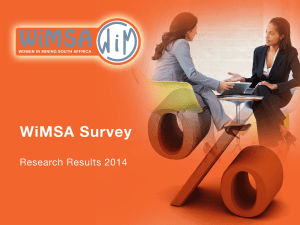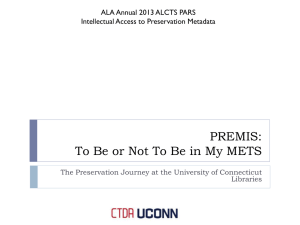On RDA Implementation 3:30-4:45 PM , Thursday, March 21, 2013
advertisement
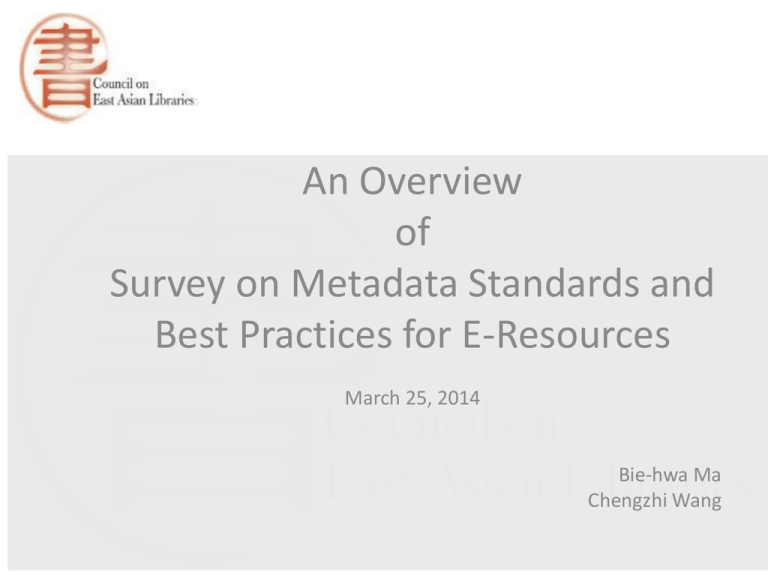
An Overview of Survey on Metadata Standards and Best Practices for E-Resources March 25, 2014 Bie-hwa Ma Chengzhi Wang Acknowledgement & Announcement Thank you for participating in the survey! Thank all of you for participating in the workshop! Thank all CEAL members for supporting the Task Force! Thank all the CTP members and the CEAL ERMB Task Force members for organizing this workshop Electronic Resources: Librarians and Vendors Round Table 9:30-11:00 pm, Thursday, March 27, Liberty Ballroom C, Philadelphia Marriott Downtown Jointly organized by CTP, CCM, CJM, CKM, and CPS, a dialog between East Asian librarians and vendors of electronic contents. Open to all CEAL members as well as vendors and electronic information providers Survey Overview Outline Why the Survey? How the Survey Was Done? What Are the Survey Results? What to Do Next? Survey Goal Environmental scan: survey as a systematic way to get empirical data Preliminary understanding of the level of awareness Identify the awareness gap between librarians and vendors, and how to bridge them Improve understanding, expand knowledge, enhance skills, and determine areas/topics to work on Survey Preparation & Design Preparation, Planning General planning and preparation Google form as the tool Designing questionnaires Deciding the length and format Testing Questionnaire Design Vendor/Publisher Version and Library Version in English, carefully reviewed by metadata and non-metadata professionals in the U.S. Translated into CJK languages with terminologies verified by professionals in Asia Reviewing, discussing, deciding, and finalizing, in English and CJK languages Survey Invitation Participation Invitation Inviting library professionals and support staff Focus on academic libraries Sent invitations through CEAL listserv and CALA (Chinese American Librarians Association) listserv in US Post it through the listservs of Library associations, consortia, and Facebook groups in Mainland china, Taiwan, Hon Kong, and Macau Inviting vendors/publishers Focus on providers of e-resources Sent English, CJK invitations to vendor/publisher sources and publisher associations via CCM, CJM and CKM Survey Management & Analysis Coordination and Organization Arranging and rationalizing timeline, and making necessary changes Coordinating work of sub groups, including online form, e-mail texts and attached Word files, all in English and 4 other scripts Organizing responses, re-inputting e-mailed responses, and checking, validating, normalizing collected data Analyzing Data An overview of Preliminary Results: Library & Vendors With Focus on Library Survey; with Briefing on Vendors Survey Region & Library Type: 73 Participants Mainland China 14 19% 1 1 2% 2% HK 9 12% Australia Europe Japan 11 15% HK Japan Korea 1 1% U.S. 25 34% 1 1% Taiwan 10 14% Singapore Taiwan U.S. Mainland China Position Library director/head Librarian Non-librarian series professional (curator, archivist, etc.) Support staff Other 13 18% 53 73% 0 0% 6 8% 1 1% Support staff 6 8% Librarian 53 73% Library director 13 18% Languages of Resources Primarily Managed/Served Chinese 49 30% Japanese 30 19% Mongolian Korean 16 10% Manchu English 56 35% Tibetan Tibetan 3 2% Other English Korean Manchu 3 2% Mongolian 2 1% Other 3 2% Japanese Chinese 0 10 20 30 40 50 60 Metadata from Vendors: Current & Expected Other Date added to the package/database Persistent links other than native URL Holdings and restrictions info Romanization Table of Contents Summary System requirements Series title Page and volume information Date of publication Publisher Place of publication Edition information Other changed titles Other identifier information ISBN/ISSN/ISRC, etc. Author/Issuing organization 0 10 20 30 40 50 60 E-resources Metadata Received: Current & Expected Other FTP pickup Posted online regularly without… Posted online regularly with notification Posted online irregularly without… Posted online irregularly with notification Sent via email upon request Sent via email automatically/regularly 0 5 10 15 20 25 30 35 40 45 Use of Metadata in Knowledge Bases (KBs) by Link Resolution Services Other None of the above We do not catalog the resources at title-level and do not use the… We convert the metadata in KBs to brief records We buy records from link resolution services 0 5 10 15 20 Challenging Level: Following CJK-related Issues in the KBs of Link Resolutions Services Few CJK providers/publishers have interaction with link resolution services Not applicable 8 12% 1 (least challenging) 3 5% 2 3 4 5 6 7 1 3 1 7 9 15 2% 5% 2% 11% 14% 23% 8 (most challenging) 18 28% Challenging Level: Following CJK-related Issues in the KBs of Link Resolutions Services Link resolution service providers' lacking expertise to manage CJK resources Not applicable 6 10% 1 (least challenging) 2 3% 2 3 4 5 6 7 4 1 10 1 10 12 6% 2% 16% 2% 16% 19% 8 (most challenging) 17 27% Awareness of Established National & Int’l Standards for E-resources Not sure 20 29% No 20 28% Yes 30 43% Standards Vendors Follow in Supplying Metadata: Current & Expected OpenURL Marc 21 ISSN, ISBN, ISRC, etc. AACR2 DOI LCSH LC Classification PIE-J 32 30 24 19 18 18 18 13 14% ISSN, ISBN, ISRC, etc. 13% OpenURL 11% RDA 9% DOI 8% LCSH 8% KBART 8% LC Classification 6% Marc 21 38 38 37 35 34 28 32 30 9% 9% 9% 8% 8% 7% 7% 7% KBART 9 4% Name authority headings (VIAF, LCNAF, etc.) 30 7% RDA 9 20 5% DDC 8 Other 6 4% PIE-J Contributor/creator identifiers (ISNI, ORCID, 4% etc.) 3% AACR2 Other classfication 6 3% PCC guidelines, CSR, BSR, P-N E-Resource 17 4% Name authority headings, LCNAF Name authority headings (VIAF, LCNAF, etc.) PCC guidelines, CSR, BSR, P-N E-Resource Contributor/creator identifiers (ISNI, ORCID, etc.) ONIX ONIX-PL 5 5 2 1 0 0 2% ONIX 2% DDC 1% ONIX-PL 0% Other classification 0% Other subject headings 0% Other 12 10 10 8 8 3 21 5% 18 4% 3% 2% 2% 2% 2% 1% Anticipated Challenging Issues When Promoting Metadata Standards to Vendors Unawareness of the standards 1 (least challenging) 2 3 4 5 6 7 8 (most challenging) 2 3% 1 2 4 6 15 12 2% 3% 7% 10% 25% 20% 19 31% 20 18 16 14 12 10 8 6 4 2 0 Anticipated Challenging Issues When Promoting Metadata Standards to Vendors Standards are too complicated to understand 1 (least challenging) 1 2% 2 1 2% 3 5 8% 4 4 7% 5 8 13% 6 17 28% 7 13 21% 8 (most challenging) 12 20% Anticipated Challenging Issues When Promoting Metadata Standards to Vendors It is tough to communicate with CJK vendors/publishers in making changes 1 (least challenging) 1 2% 2 1 2% 3 3 5% 4 5 8% 5 6 10% 6 14 23% 7 10 17% 8 (most challenging) 20 33% Survey Demographics: 22 Participants of Vendors Survey Mainland China Taiwan Japan Korea North America 3 5 7 6 1 14% 23% 32% 27% 5% 0-5 years 6-10 years 11-15 years 16+ years 6 4 6 6 27% 18% 27% 27% Publisher Vendor/Provider/Aggregator Platform provider Identifier registry provider (e.g., DOI registration agency) Other 10 18 7 2 1 26% 47% 18% 5% 3% Types & Languages of E-resources Primarily Provided E-books Other full-text databases (journal articles, proceedings, dissertations, etc.) E-journals 16 28% 16 28% 9 16% References/Indexes Databases 9 16% Online news sources Maps/GIS Streaming media Other 6 10% 1 2% 1 2% 0 0% Japanese English Chinese Korean Mongolian Other Tibetan Manchu 11 10 9 5 1 1 0 0 30% 27% 24% 14% 3% 3% 0% 0% Metadata Service Provision Title lists of current resources only, excluding the withdrawn titles Comprehensive title lists labeled with material status, such as withdrawn, ceased, etc. Comprehensive title lists plus separate title lists/sheets for new titles and withdrawn titles Free brief MARC records Fee-based brief MARC records Free full-level MARC records Fee-based full-level MARC records 11 33% 6 18% 2 6% 4 12% 2 6% 2 6% 2 6% Subject headings and classification numbers assignment service 2 6% URL checking service 2 6% An automatic mechanism that facilitates easy online error report and instant fix on access and metadata problems 0 0% Other 0 0% Relationship with, & Frequency Updating Title Lists to, Link Resolution Services Proactively provide them with title lists with or without fee 7 25% Never interacted, in consideration of doing so 6 21% Proactively provide them with MARC records with or without fee 4 14% Metadata available upon request 4 14% Never interacted, have no plan of doing so Metadata freely downloaded from website Other 3 11% 2 7% 2 7% Monthly Weekly Upon request Quarterly Semiannually Annually Other 4 3 3 2 1 1 0 29% 21% 21% 14% 7% 7% 0% Awareness of Established National and Int’l Standards for Electronic Resources Yes 8 38% No 4 19% No, but wish to get informatio n on this 9 43% No, but wish to know more 9 43% Yes 8 38% No 4 19% Awareness of E-Resources Standards & Best Practices: Library and Vendors Not sure 20 29% No, but wish to know more 9 43% Yes 30 43% Yes 8 38% No 4 19% No 20 28% Vendors/Publishers Library Staff 26 Compliance of Standards & Best Practices: Currently Follow & Interested in Following Marc 21 Other classfication OpenURL 8 7 6 15% OpenURL 13% DOI 11% Marc 21 9 8 7 16% 14% 12% ISSN, ISBN, ISRC, or other publication identifiers 6 11% ISSN, ISBN, ISRC, or other publication identifiers 6 11% PIE-J KBART DOI LCSH Dewey Decimal Classification (DDC) AACR2 RDA ONIX ONIX-PL 5 4 4 3 3 2 2 2 1 9% 7% 7% 5% 5% 4% 4% 4% 2% 4 3 3 3 2 2 2 2 2 7% 5% 5% 5% 4% 4% 4% 4% 4% Name authority headings (VIAF, LCNAF, etc.) 1 2% 2 4% Other PCC guidelines, CSR, BSR, P-N E-Resource Other subject headings LC Classification Creator/contributor identifiers (ISNI, ORCID, etc.) 1 0 0 0 0 2% 0% 0% 0% 0% 1 1 0 0 0 2% 2% 0% 0% 0% KBART PIE-J Other subject headings Dewey Decimal Classification (DDC) AACR2 RDA LCSH LC Classification Other classification Creator/contributor identifiers (ISNI, ORCID, etc.) ONIX Name authority headings (VIAF, LCNAF, etc.) PCC guidelines, CSR, BSR, P-N E-Resource ONIX-PL Other Reasons Why not Complying with Some or All of the Standards and Best Practices We will consider complying with the standards for the future resources/databases, but not for the existing ones as it is too time consuming and costly to change what we have designed Such metadata do not accommodate the needs of CJK resources/scripts Complying with the standards increases the product cost in human resource, facilities of hardware and software, etc. 6 21% 5 18% 5 18% Such metadata do not necessarily eliminate problems 4 14% Unawareness of the standards Lack metadata expertise to provide certain metadata Standards are too complicated to understand Other 3 11% 3 11% 1 4% 1 4% Thank You
